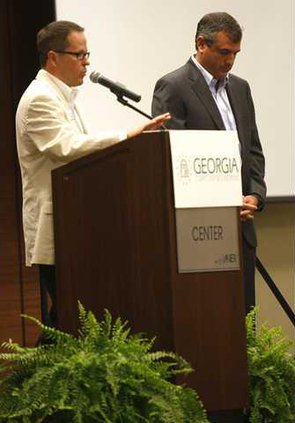On the Net
Want to make your voice heard? An online survey will be open through the end of August for those unable to attend the Governor's Competitiveness Initiative's regional meetings. It can be accessed online.
Infrastructure, technology, transportation and education were among the topics addressed during a regional economic development meeting Thursday.
About 150 people from 13 northeastern Georgia counties took part in the Governor's Competitiveness Initiative's regional meeting at the Lanier Technical College Forsyth Conference Center.
The session's purpose was to gather input from business and government leaders, as well as residents, on ways to strengthen the state's economy.
The meetings are being held in each of the Georgia Economic Development Department's 12 regions.
Thursday's gathering was for Forsyth, Hall, Dawson, Lumpkin and White counties. Also
included were Banks, Franklin, Habersham, Hart, Rabun, Stephens, Towns and Union counties.
Amy Booker, president of the Dahlonega-Lumpkin County Chamber of Commerce and Visitors' Center, said she was pleased with the meeting.
"It's very exciting, and I applaud the governor for inspiring a sense of collaboration and creating a vision to bring together local communities and regions," Booker said.
Chris Cummiskey, commissioner of the Georgia Department of Economic Development, said several topics seem to surface in all the regions.
"From our prospective, that's good because it's easier to address eight to 12 larger problems than 30 smaller ones," he said.
Cummiskey added that the three areas most people seem to agree need improvement in Georgia are transportation, work force development and initiative packages to attract new businesses.
Chris Clark, president of the Georgia Chamber of Commerce, agreed.
"Overall, the big issues seem to be the same across the state," he said. "We're hearing a lot about K through 12 education, infrastructure, increased work force and state initiatives."
Booker said the meeting also seemed to inspire attendees to evaluate the strengths and weaknesses of their own counties.
"It's really interesting in that there now seems to be a lot of interest at the local levels to go out to do this sort of process in our own communities," she said. "Hopefully this [meeting] will inspire more of that coming together and collaboration locally and regionally."
Cummiskey said two more regional meetings will be held over the next few weeks.
An online survey for those unable to attend the sessions will be available through August.
The governor will get a report on all the input.
"You'll probably see that report by the end of this year, and there will likely be some legislative actions as a result in 2012," he said.




